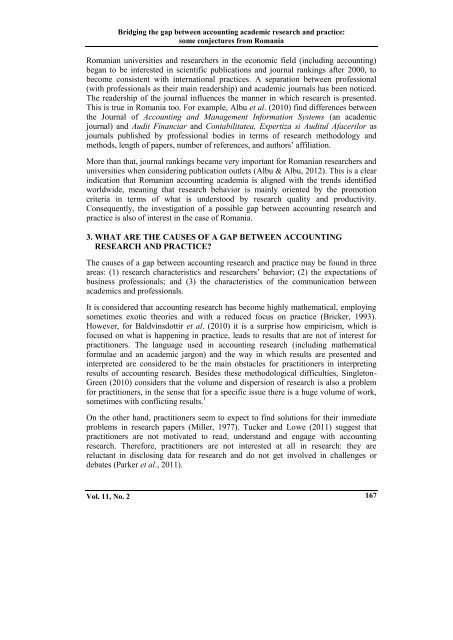bridging the gap between accounting academic research and practice
bridging the gap between accounting academic research and practice
bridging the gap between accounting academic research and practice
You also want an ePaper? Increase the reach of your titles
YUMPU automatically turns print PDFs into web optimized ePapers that Google loves.
Bridging <strong>the</strong> <strong>gap</strong> <strong>between</strong> <strong>accounting</strong> <strong>academic</strong> <strong>research</strong> <strong>and</strong> <strong>practice</strong>:some conjectures from RomaniaRomanian universities <strong>and</strong> <strong>research</strong>ers in <strong>the</strong> economic field (including <strong>accounting</strong>)began to be interested in scientific publications <strong>and</strong> journal rankings after 2000, tobecome consistent with international <strong>practice</strong>s. A separation <strong>between</strong> professional(with professionals as <strong>the</strong>ir main readership) <strong>and</strong> <strong>academic</strong> journals has been noticed.The readership of <strong>the</strong> journal influences <strong>the</strong> manner in which <strong>research</strong> is presented.This is true in Romania too. For example, Albu et al. (2010) find differences <strong>between</strong><strong>the</strong> Journal of Accounting <strong>and</strong> Management Information Systems (an <strong>academic</strong>journal) <strong>and</strong> Audit Financiar <strong>and</strong> Contabilitatea, Expertiza si Auditul Afacerilor asjournals published by professional bodies in terms of <strong>research</strong> methodology <strong>and</strong>methods, length of papers, number of references, <strong>and</strong> authors’ affiliation.More than that, journal rankings became very important for Romanian <strong>research</strong>ers <strong>and</strong>universities when considering publication outlets (Albu & Albu, 2012). This is a clearindication that Romanian <strong>accounting</strong> academia is aligned with <strong>the</strong> trends identifiedworldwide, meaning that <strong>research</strong> behavior is mainly oriented by <strong>the</strong> promotioncriteria in terms of what is understood by <strong>research</strong> quality <strong>and</strong> productivity.Consequently, <strong>the</strong> investigation of a possible <strong>gap</strong> <strong>between</strong> <strong>accounting</strong> <strong>research</strong> <strong>and</strong><strong>practice</strong> is also of interest in <strong>the</strong> case of Romania.3. WHAT ARE THE CAUSES OF A GAP BETWEEN ACCOUNTINGRESEARCH AND PRACTICE?The causes of a <strong>gap</strong> <strong>between</strong> <strong>accounting</strong> <strong>research</strong> <strong>and</strong> <strong>practice</strong> may be found in threeareas: (1) <strong>research</strong> characteristics <strong>and</strong> <strong>research</strong>ers’ behavior; (2) <strong>the</strong> expectations ofbusiness professionals; <strong>and</strong> (3) <strong>the</strong> characteristics of <strong>the</strong> communication <strong>between</strong><strong>academic</strong>s <strong>and</strong> professionals.It is considered that <strong>accounting</strong> <strong>research</strong> has become highly ma<strong>the</strong>matical, employingsometimes exotic <strong>the</strong>ories <strong>and</strong> with a reduced focus on <strong>practice</strong> (Bricker, 1993).However, for Baldvinsdottir et al. (2010) it is a surprise how empiricism, which isfocused on what is happening in <strong>practice</strong>, leads to results that are not of interest forpractitioners. The language used in <strong>accounting</strong> <strong>research</strong> (including ma<strong>the</strong>maticalformulae <strong>and</strong> an <strong>academic</strong> jargon) <strong>and</strong> <strong>the</strong> way in which results are presented <strong>and</strong>interpreted are considered to be <strong>the</strong> main obstacles for practitioners in interpretingresults of <strong>accounting</strong> <strong>research</strong>. Besides <strong>the</strong>se methodological difficulties, Singleton-Green (2010) considers that <strong>the</strong> volume <strong>and</strong> dispersion of <strong>research</strong> is also a problemfor practitioners, in <strong>the</strong> sense that for a specific issue <strong>the</strong>re is a huge volume of work,sometimes with conflicting results. 1On <strong>the</strong> o<strong>the</strong>r h<strong>and</strong>, practitioners seem to expect to find solutions for <strong>the</strong>ir immediateproblems in <strong>research</strong> papers (Miller, 1977). Tucker <strong>and</strong> Lo we (2011) suggest thatpractitioners are not motivated to read, underst<strong>and</strong> <strong>and</strong> engage with <strong>accounting</strong><strong>research</strong>. Therefore, practitioners are not interested at all in <strong>research</strong>: <strong>the</strong>y arereluctant in disclosing data for <strong>research</strong> <strong>and</strong> do not get involved in challenges ordebates (Parker et al., 2011).Vol. 11, No. 2 167
















